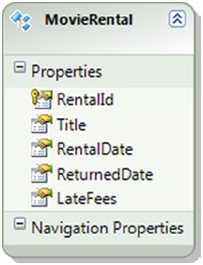标签:
11-9. 在LINQ中使用规范函数
问题
想在一个LINQ查询中使用规范函数
解决方案
假设我们已经有一个影片租赁(MovieRental )实体,它保存某个影片什么时候租出及还回来,以及滞纳金等,如Figure 11-9. 所示:

Figure 11-9. The MovieRental entity that has the dates for a rental period along with any late fees
我们想取得所有租期超过10天的影片
如何创建和使用查询,如Listing 11-16所示:
Listing 11-16. Retrieving the Late Movies using the DateDiff() Function
class Program
{
static void Main(string[] args)
{
RunExample();
}
private static void RunExample()
{
using (var context=new EFRecipesEntities())
{
var mr1 = new MovieRental
{
Title = "A Day in the Life",
RentalDate = DateTime.Parse("2/19/2013"),
ReturnedDate = DateTime.Parse("3/4/2013"),
LateFees = 3M
};
var mr2 = new MovieRental
{
Title = "The Shortest Yard",
RentalDate = DateTime.Parse("3/15/2013"),
ReturnedDate = DateTime.Parse("3/20/2013"),
LateFees = 0M
};
var mr3 = new MovieRental
{
Title = "Jim‘s Story",
RentalDate = DateTime.Parse("3/2/2013"),
ReturnedDate = DateTime.Parse("3/19/2013"),
LateFees = 3M
};
context.MovieRentals.Add(mr1);
context.MovieRentals.Add(mr2);
context.MovieRentals.Add(mr3);
context.SaveChanges();
}
using (var context = new EFRecipesEntities())
{
Console.WriteLine("Movie rentals late returns");
Console.WriteLine("==========================");
var late = from r in context.MovieRentals
where DbFunctions.DiffDays(r.RentalDate, r.ReturnedDate) > 10
select r;
foreach (var rental in late)
{
Console.WriteLine("{0} was {1} days late, fee: {2}", rental.Title,
(rental.ReturnedDate - rental.RentalDate).Days - 10,
rental.LateFees.ToString("C"));
}
}
}
}
上述Listing 11-16代码输出结果如下:
Movie rentals late returns
==========================
A Day in the Life was 3 days late, fee: $3.00
Jim‘s Story was 7 days late, fee: $3.00
它是如何工作的?
定义在EF里的规范函数, 它可以不被数据源所知道,而且能被数据提供器支持.规范函数返回的数据类型是根据实体数据模型的类型定义的.
在本小节里,我们使用DiffDays() 函数来计算两个日期的所差的天数,由于DiffDays()是一个规范函数,所以它能被数据所有提供者执行.
最佳实践
你可能会问自己“什么时候应该用实体函数?”. EF提供者把一些表达式翻译成规范函数, 但是这种翻译能力是有限的.不是每个运行时方法都能翻译成相应的规范函数,这里是一些最佳实践,如果可以翻译,那么就使用它,这样能使代码易读.如果不能翻译,那么就明确地使用EntityFunction类来调用规范函数,就像下列的代码片段:
var laterentals = from r in context.MovieRentals
where (r.ReturnedDate - r.RentalDate).Days > 10
select r;
上面这句,不能翻译成规范函数,所以你应该使用下列这句:
var laterentals = from r in context.MovieRentals
where EntityFunctions.DiffDays(r.RentalDate,
r.ReturnedDate) > 10
select r;
Entity Framework 6 Recipes 2nd Edition(11-9)译 -> 在LINQ中使用规范函数
标签:
原文地址:http://www.cnblogs.com/kid1412/p/5159023.html